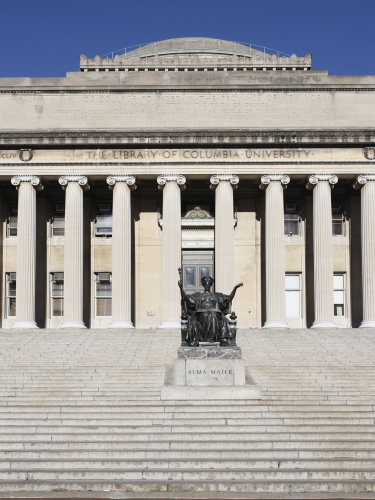
Six Columbia Law School Graduates Receive Human Rights Institute Commendation for their Demonstrated Commitment to Human Rights
May 12, 2021, New York—The Human Rights Institute is pleased to announce the 2021 recipients of the Columbia Law School Human Rights Institute’s Commendation for Leadership and Commitment in Human Rights. In recognition of their outstanding leadership in human rights while in law school, the Institute honors six remarkable law students: Adi Radhakrishnan ’21 J.D., Meg Gould ’21 J.D., Meghan Lucas ’21 J.D., Rosario Grima Algora ’21 LL.M., Shannon Marcoux ’21 J.D., and Udodilim (U.d.) Nnamdi ’21 J.D.
Awardees are selected based on their commitment to advancing human rights opportunities at Columbia, engagement in activities in and out of the law school, mentorship of their peers, and deep commitment to advancing the human rights field.
This year’s award recipients were nominated by their peers and selected by the Human Rights Institute Faculty Co-Directors Sarah Cleveland and Sarah Knuckey and staff JoAnn Kamuf Ward, Sarah Mehta, Priyanka Motaparthy, Anjli Parrin, Jessica Pierson, Gulika Reddy, and Tony Wilson.
The Human Rights Institute faculty and staff congratulate Adi, Meg, Meghan, Rosario, Shannon, and U.d. for their extraordinary achievements. “This year’s recipients have already made a lasting impact on the human rights community at Columbia and beyond, and contributed to significant developments in human rights scholarship and practice,” reflected JoAnn Kamuf Ward, Director of the Institute’s Human Rights in the U.S. Project. “We are grateful for the ways awardees have shown a commitment to advancing dignity and rights globally, putting theory and critical reflection into practice.”
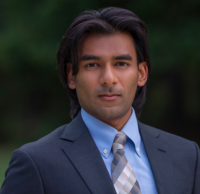
While at Columbia Law School, Adi Radhakrishnan ’21 J.D. committed significant time to strengthening human rights and social justice, with a focus on global health. He was a Human Rights Institute 1L Advocate, professional development chair for the South Asian Law Students Association, a notes editor for the Columbia Human Rights Law Review, a competitor-coach on the Jessup International Law Moot Court team, and a member of student groups including the Columbia Society of International Law, the Student Public Interest Network, and First Generation Professionals. As a student in the Human Rights Clinic, Adi engaged in participatory research and advocacy to improve higher education and health in Kashmir. He interned with the U.S. State Department in Washington D.C., the O’Neill Institute for National and Global Health Law, analyzing responses to COVID, as well as ICAP in Kisumu and Nairobi, Kenya. Adi was a research assistant on several Human Rights Institute projects, and provided research to the Center for Justice and Accountability, advancing redress for human rights abuses in domestic and international courts. Adi published papers on human rights and the Genocide Convention and presented his research at the Human Rights Institute Paper Symposium and the Salzburg Global Cutler Law Program. For his work in law school, Adi received the Edwin Parker Prize, the Parker School Recognition of Achievement in International Law, and was also a James Kent Scholar and a Harlan Fiske Stone Scholar. Following graduation, Adi will work at Human Rights Watch as the Leonard H. Sandler Fellow.
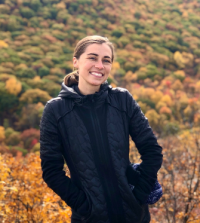
Meg Gould ’21 J.D. is dedicated to advocating for access to justice and human rights in the United States and abroad. At Columbia, Meg served as co-president of Rightslink, co-chair of the International Refugee Assistance Project, outreach chair for the Human Rights Institute 1L Advocates Program, a Human Rights Law Review staff member, and a staffer and executive editor for the Jailhouse Lawyers Manual. She was also a member of the Frederick Douglass Moot Court team and co-led the Rightslink caravan to Beirut, Lebanon. During her 1L year, Meg was awarded the Davis Polk Leadership Fellowship, allowing her to co-found the Paralegal Pathways Initiative, which connects formerly incarcerated individuals with employment opportunities in the legal field. As a student in the Human Rights Clinic, Meg engaged in legal advocacy to promote transitional justice in the Central African Republic. As a law student, Meg also worked with AdvocAid—Sierra Leone, the International Legal Foundation, the Maryland Federal Defenders, the Bronx Defenders, and the Office of the Legal Adviser for the State Department. Meg was a James Kent Scholar, Harlan Fiske Stone Scholar, and a 2021 winner of the Jane Marks Murphy Prize. She will clerk on the U.S. District Court in Western Tennessee after graduation, followed by a U.S. Court of Appeals for the 6th Circuit clerkship.
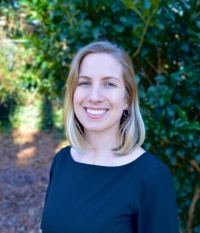
Meghan Lucas ’21 J.D. is devoted to challenging employment practices that disproportionately exploit workers based on race and legal status. Starting with her time as a Human Rights Institute 1L Advocate, Meghan sought out strategies to advance economic rights, learning from international human rights and domestic public interest communities. As a student in the Community Advocacy Lab Clinic, Meghan advanced legislative reforms at the intersection of racial and economic justice. She was an active member of the National Lawyers Guild and served as the vice-president and policy chair of the Society for Immigrant and Refugee Rights (SIRR). Meghan participated in the SIRR immigration law moot court and spent her law school summers working on asylum issues, including labor trafficking and removal defense. As a 3L, she helped workers obtain unemployment benefits after losing jobs due to COVID-19. Following graduation, Meghan will continue to support low-wage workers’ rights at the Charlotte Center for Legal Advocacy in North Carolina, as an Equal Justice Works Fellow.

Rosario Grimà Algora ’21 LL.M. came to Columbia Law School as a human rights fellow. Prior to law school, she focused on women’s human rights and refugee rights through work in domestic NGOs, and international organizations. At Columbia, Rosario charted a towards a Ph.D., examining the theoretical underpinnings of human rights, and she also developed a reading group with Professor Sanger on Meaning of Motherhood. Grimà Algora developed a paper on reproductive rights in Latin America, which she presented at Columbia Human Rights Institute Paper Symposium, and which was awarded the honor of best human rights essay from the Institute of Studies of Human Rights. Marrying theory and practice, Rosario worked with a team of students to develop a racial justice campaign on the issue of social holds, a project that is ongoing with Professor Katherine Franke. Rosario also participated in several student organizations and coordinated a group on migration and refugees. After Columbia, she plans to prioritize gender issues, particularly sexual and reproductive rights, as a recipient of the Columbia Law School Global Public Service Fellowship. Rosario will be a research assistant for the Center for Gender & Sexuality Law Equal Rights Project, with Professor Franke and Ting Ting Cheng.
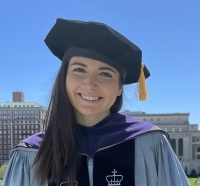
Shannon Marcoux ’21 J.D. is pursuing a career at the intersection of human rights and environmental justice. While at Columbia, Shannon had several leadership roles, including coordinator for the Human Rights Institute 1L Advocates Program, advocacy co-president of the Student Public Interest Network, research chair for Rightslink, environmental law moot court program coach, and a member of the Human Rights Institute Student Advisory Committee. As a student in the Human Rights Clinic, Shannon worked on a team conducting research and advocacy to advance the right to education in Kashmir. Shannon spent her summers working with Natural Justice, EarthRights International, and Dejusticia, she also interned with Human Rights Watch, the Columbia Center on Sustainable Investment, and the Center for Constitutional Rights, and worked with LGBTQ+ asylum seekers. Shannon is currently an advisor for the International Center for Advocates Against Discrimination. Her research on the human rights impacts of U.S. military presence and weapons testing in the Marshall Islands has been published in Columbia Human Rights Law Review Online and Environmental Claims Journal, and she presented this research at the Human Rights Institute Paper Symposium in 2020. Shannon served as an articles editor for the Columbia Human Rights Law Review and was a Harlan Fiske Stone Scholar and Dean’s Honors recipient. After graduation, Shannon will return to Natural Justice as a Leebron Fellow, focused on climate justice and human rights.
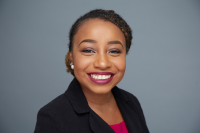
Udodilim (U.d.) Nnamdi ’21 J.D. advanced human rights at Columbia while also pursuing an LL.M. in International Criminal law at the University of Amsterdam. As a 1L, U.d. participated in the Human Rights Advocates Program and European Law Moot Court team. As a Davis Polk Leadership Fellow, she developed pathways to diversify the international human rights field. U.d. spent her 1L summer working for Philip Alston, the former UN Special Rapporteur on Extreme Poverty and Human Rights, and supporting grassroots, African women-led organizations in Ghana, Zimbabwe, and Cameroon through Columbia University Earth Institute’s Women, Peace, & Security Program. During her time at Columbia, U.d. was selected as a SIPA International Fellow and served as Teaching Assistant for Prof. Sarah Cleveland’s Transnational Litigation 1L seminar, a staff editor for the Human Rights Law Review, the public interest chair of Columbia’s Society for International Law, the co-president of RightsLink, and the Black Law Student Association’s international service trip chair. During her year in the Human Rights Clinic, U.d. worked on the Central African Republic war crimes accountability project. U.d. penned a thesis on police brutality against Black Americans as genocide in her 3L year. As a summer associate, U.d. worked at Cohen Milstein, bringing civil and human rights class actions, and at Foley Hoag, focusing on public international law in international courts and tribunals. During Law School, U.d. also interned at both the Center for Constitutional Rights and the Center for Justice & Accountability, focused on domestic human rights litigation. U.d. was a co-lead in the effort to secure Columbia Law School’s inaugural anti-racism grant to strengthen the Law School’s focus on global racial justice issues, increase diversity, and expand opportunities for Law School students to work in sub-Saharan Africa.
